Alison's flower farm
Alison Watts is passionate about building a business whose impact on the environment is purely positive. Alison’s passion for nature began early. As a little girl growing up in England she spent many happy hours in her grandmother’s huge and beautiful flower garden.
Now, as a professional florist, it’s the special power flowers have to make people happy that fuels her passion. “The best part is the look on people’s faces when they see their flowers.”
But while training as a florist she also realised she wanted no part of any enterprise that depended on foams, plastic wrapping and other toxic conventions. “Early on, I decided I wanted to bring beautiful, fresh flowers to people - flowers that would be free of sprays and chemicals. There would be no air miles and zero plastic wrapping.” Alison’s business name, ‘Bee and Bloom’ proudly supports this ethos. “Without bees there would be no food, flowers or life,” she explains.
Key to Alison’s business vision was the need to grow her own flowers. Work began on her little flower farm as soon as she and her husband Brodie moved from Wellington into their home on the Kapiti Coast. Their little boy, Toby was just one. “Every nap time I’d race to put on my wellies, grab my spade and start digging. I had to work fast!” Alison recalls.
The first task she set herself was to clear her planting space - a pair of long narrow raised beds - of overgrown shrubs and weeds. “It took me about a month to get it all cleared and ready for planting with compost and weed mat.” That first spring she planted annuals and dahlias and sold her first bouquet to a neighbour the week before Christmas. “Word soon spread and I was in business before I knew it! I surprised to find how much of demand there was for freshly cut flowers.”
She has learned a lot in the years since. Not least that her very sandy soil would need constant attention. Happily, the long narrow shrub beds had been well-mulched over the years, resulting in a good build up of soil organic matter. Alison has plans to extend her planting beds to give her more growing space but for now, the kikuyu covered remaining backyard serves as a useful play space for a very active preschooler.
“I work hard to amend my soil, and give back what I take away,” says Alison. “It’s a real labour of love but I'm getting there!” She plies her soil with lots of compost, and feeds it with blood and bone and worm tea. She also makes her own ‘comfrey tea’ fertiliser, which is high in potassium and good for flowering plants. “I also get alpaca poo from my friends at Five Gates Farm in Te Horo. It’s very mild and great for the garden when buried.”
To control weed growth she plants her annuals into weed mat, which is reusable and will last for many years. In her dahlia beds pea straw forms a thick mat that blocks weeds for most of the season. “But it’s important to leave space around each crown to prevent rot,” she advises.
Asked how she keeps her flowers healthy without spraying, Alison says, “Mainly I just look after them - watering and feeding properly. I stake and net plants so they’re not wind stressed and susceptible to bug attacks.”
Earwigs on dahlias are a huge problem but scrunched up newspaper works really well for her. “The earwigs crawl in and you can then dispose of them as you see fit! I check on the flowers several times a day during summer. It ’s time consuming but worth it. The best quality takes care and attention,” she says.
Brodie helped to install a trickle irrigation system throughout all of Alison’s flower beds. A rainwater tank connected to the roof of her studio is a future proofing measure. Alison is delighted with her new flower studio. Well-lit with a skylight, it doubles as greenhouse for her seed sowing.
Alison’s little flower farm is surprisingly small. “People often assume I have paddocks of space, but my main growing space is only 25 square metres,” she says.
To make the most of her space she plants intensively and plans carefully. Around the perimeter of the section she has kept any useful shrubs and foliage plants that were planted by previous gardeners, adding her own favourite foliage plants to provide a base for her bouquets. For winter picking she is planting shrubs like protea and leucadendron, which are very drought tolerant. These shrubs also contribute to her reserve of beautiful dried flowers, especially useful between seasons.
“I also grow some things in pots. Right now I have some tulips in pots and some hardy annuals which will give me a head start on spring. You don’t need a big section to grow flowers, you just need to get growing! Seeing things flourishing brings me such satisfaction. I love filling buckets full of fresh seasonal flowers and taking them to my studio to create bouquets that will make someone’s day.”
Alison grows all her own flowers for her main florist season, which extends from September to March. “Covid halted my business as it did for everyone, but the flowers kept blooming. I put buckets and buckets of them out for my neighbours who passed them on to elderly family and friends. It was amazing and meant people could enjoy flowers and hopefully smile a little.”
Bee and Bloom is all about keeping things local and Alison says she is truly humbled and grateful for the support she has received from her community. “I’m lucky that I get to do what I’m passionate about and share it with people. It’s an amazing feeling to gather armloads of fresh flowers and make a huge bouquet knowing that it’s all from my own garden!”
GG: What are some of your favourite plants?
Alison: Annuals are probably my faves, they give it all they’ve got for one season then set seed (which I collect!). They really put on a show. Dahlias too - it’s astounding how much beauty comes from such an ugly tuber! There are so many varieties and colours available it becomes a bit of an addiction!
GG: What flowers do you recommend for a beginner to grow for picking?
Alison: Cosmos is great for cut and come again, will flower non-stop and give you buckets of blooms all summer. Statice is a prolific grower and comes in lots of colours. It’s also great dried. In late summer when things hot up you just can’t beat zinnias. Pollinators love them and their huge blooms are just so cheery. Dahlias are easy to grow and such excellent value - even just two or three plants will give you loads of flowers. Strawflowers can be sown in autumn or spring and are stunning fresh or dried - great for crafts and wreath making.
GG: Any seed sowing tips?
Alison: Don’t be intimidated when sowing seed! I’m not an expert but sometimes I think you can try too hard. Quite often seeds just need more time or a slight change in temp or light to germinate. Try not to over water and don’t give up, if it doesn't work just try again. I am a seed saver! I collect seed in autumn and then re-sow it whilst it’s fresh. I also scatter some around the garden and it never fails to surprise me where seeds will germinate! I then either leave them where they are or pot them up.
GG: Do you have any favourite gardening tools or accessories?
Alison: You’ll laugh but the best tool I own is a butter knife! I use it to plant all my annuals. It’s the perfect size and shape. I also use it when potting up seedlings.
Alison’s Joy Jars
It was one of Alison’s delighted customers who can up with the name Joy Jar for her charming gift posy in a recycled jar. No foam or plastic required - just a simple card tied with natural string. Alison says the Joy Jars are a hit for customers wanting to brighten their own work desk or pick up a thank-you gift for a friend. Joy Jars travel well in the car and are very simple to look after.
Create you own Joy Jar….
- Pick a selection of foliage and flowers from the garden. Alison includes three to five ‘focals’ in each bunch. These are the bold and beautiful hero flowers, such as dahlias, tulips or anemones (pictured here).
- Place flowers up to their necks in cold water without delay.
- To build your posy, fill a jar with fresh cold water and start with your foliage. Add smaller support flowers next (e.g. small daisies, rock roses, thyrptemene). Pack the jar so that the flower stems hold everything together then lastly add your focal flowers.
- Flowers last longest if the water is renewed each day, with stem ends trimmed every two or thee days. Remove individual flowers as they fade and your Joy Jar should last a week or more.
Find out more at Bee & Bloom Florist and Flower Garden.

15-Feb-2024
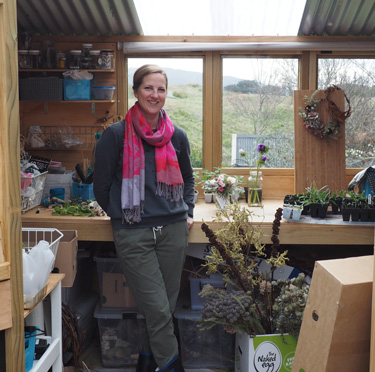
Alison Watts
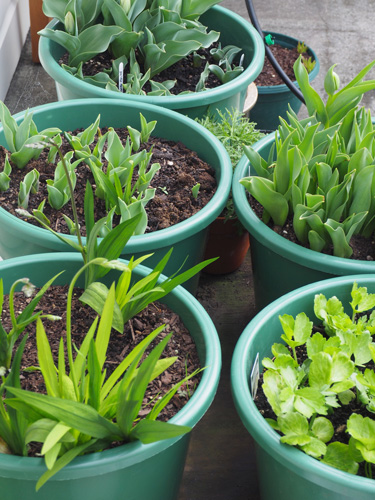
Pottred tulips, freesias and ranunculus emerge in early spring.
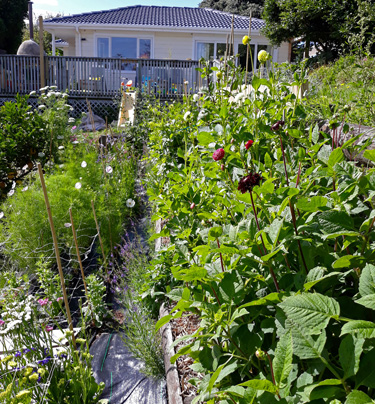
Alison's garden in summer
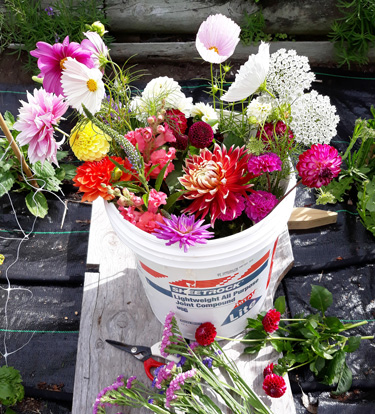
Freshly picked dahlias, cosmos and zinnias in a bucket of cold water ready for the studio
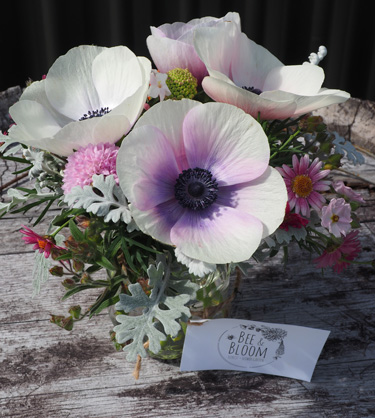
Alison's Joy Jar


